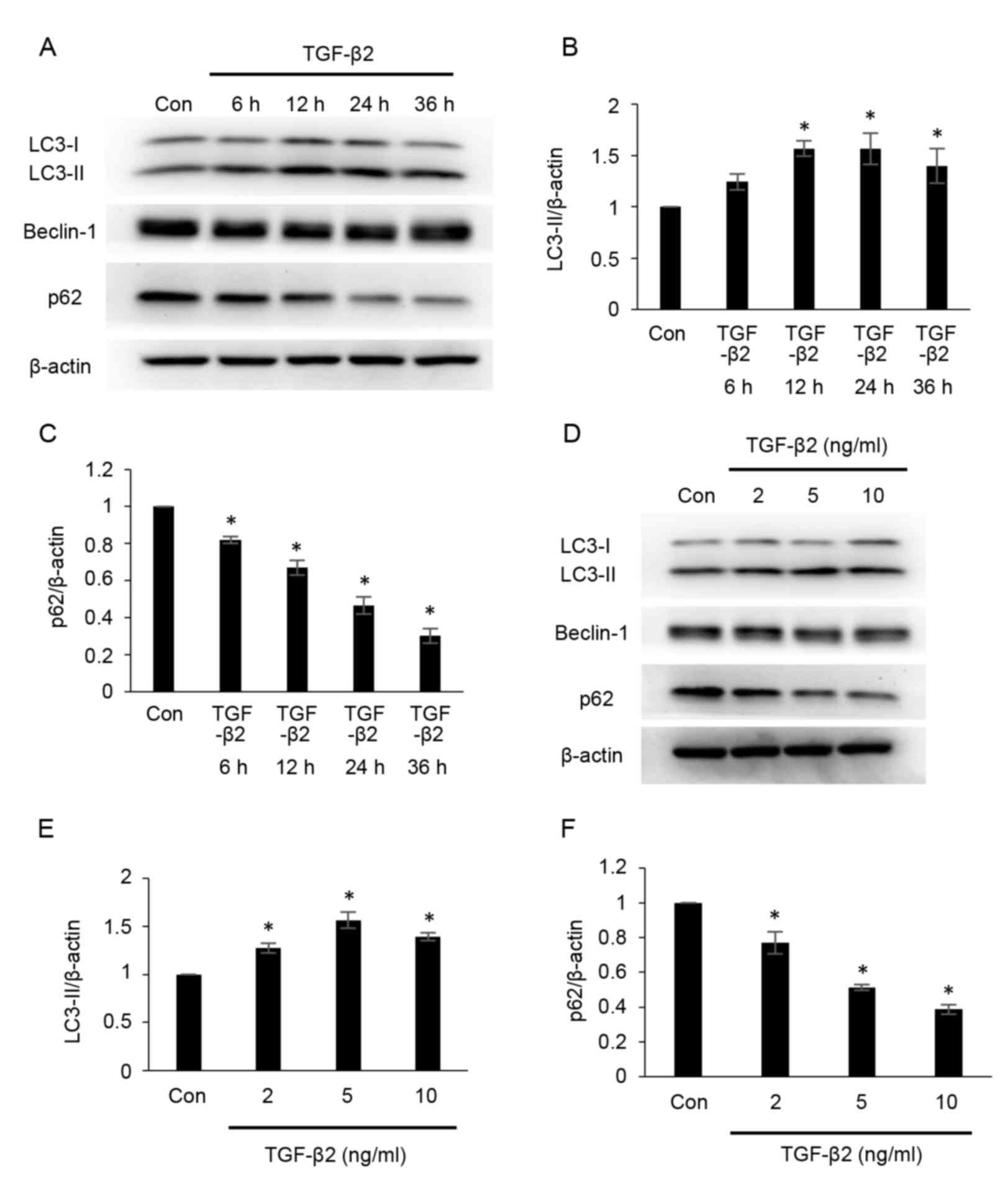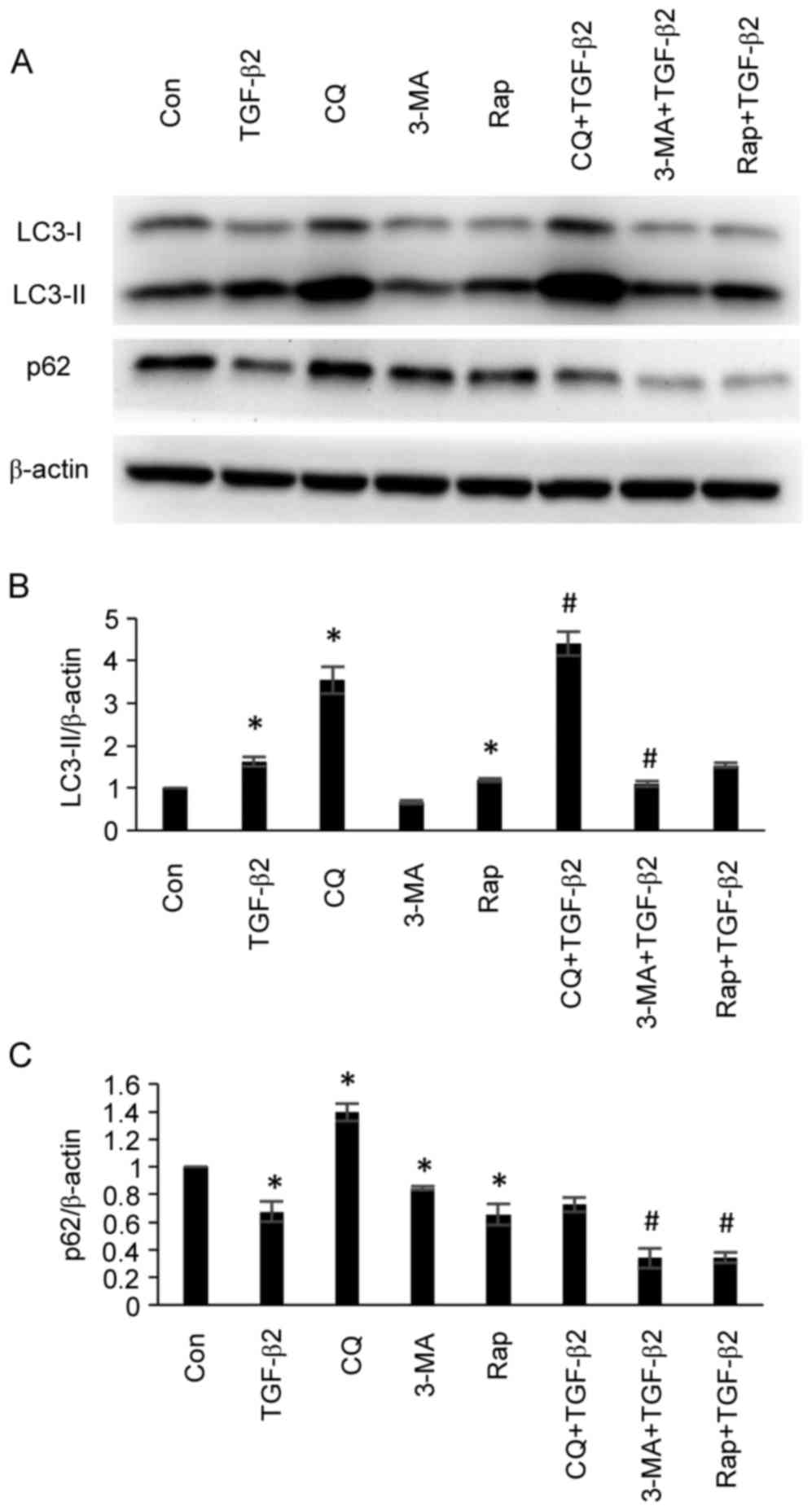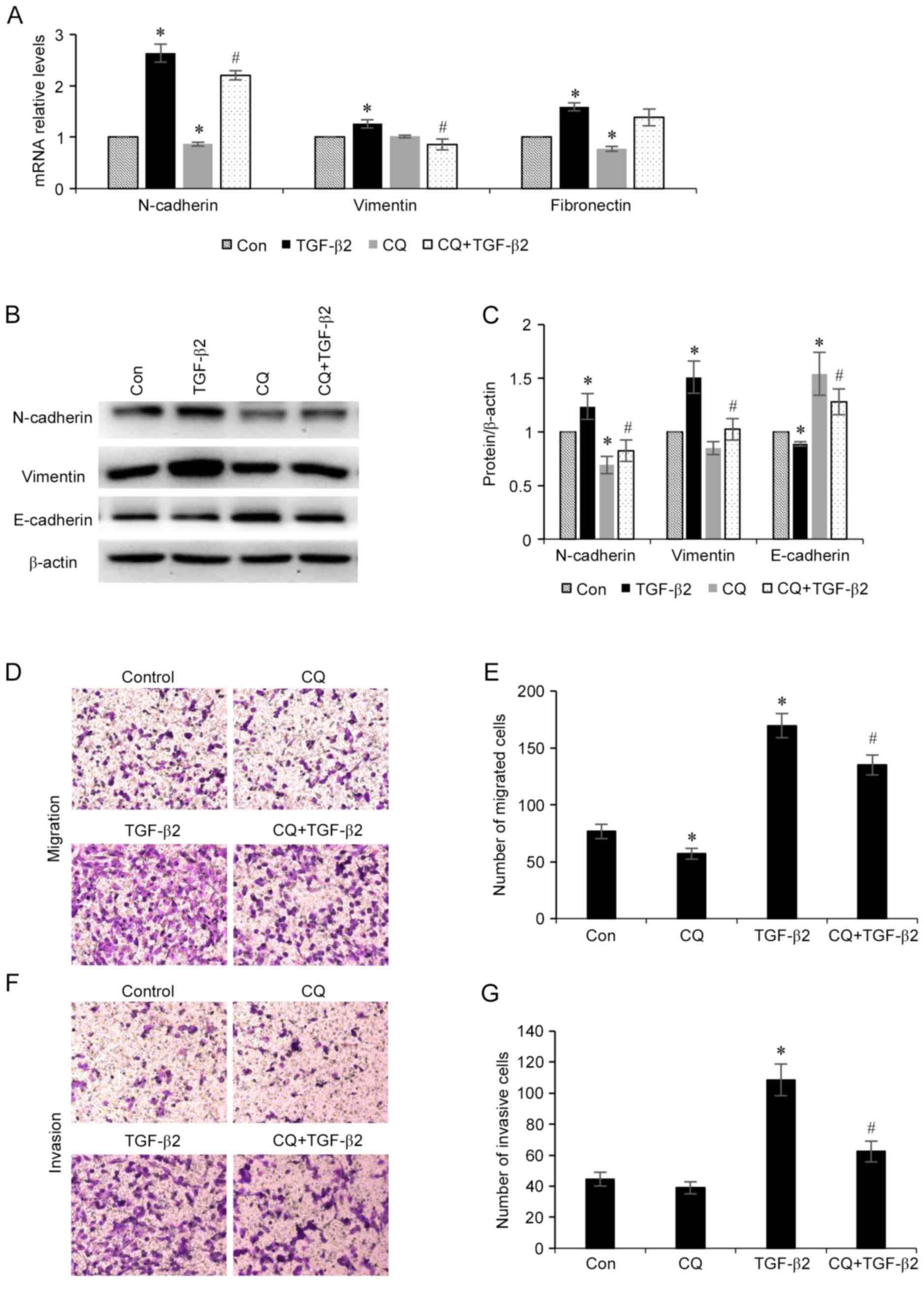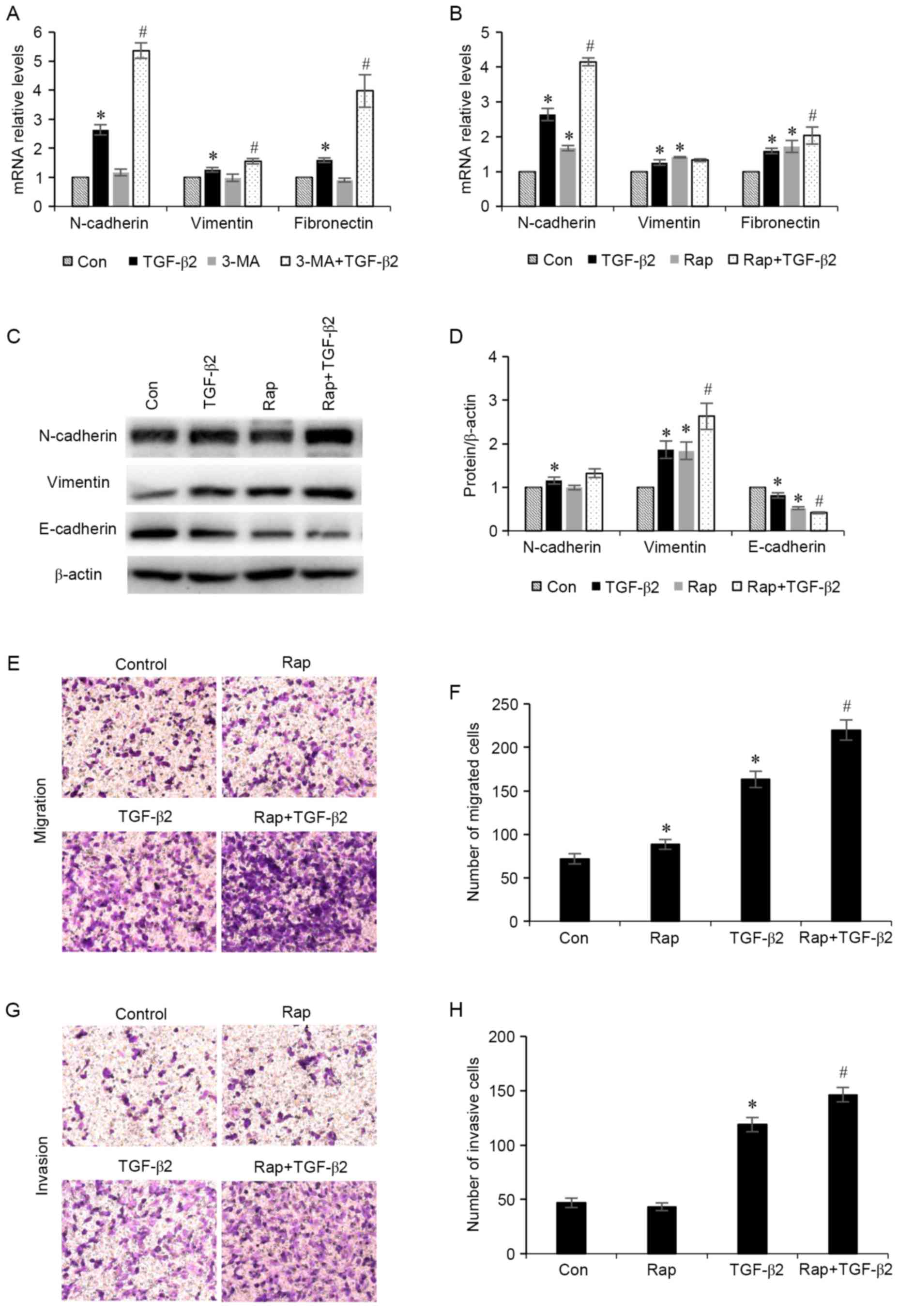|
1
|
Strauss O: The retinal pigment epithelium
in visual function. Physiol Rev. 85:845–881. 2005. View Article : Google Scholar : PubMed/NCBI
|
|
2
|
Priglinger CS, Obermann J, Szober CM,
Merl-Pham J, Ohmayer U, Behler J, Gruhn F, Kreutzer TC, Wertheimer
C, Geerlof A, et al: Epithelial-to-mesenchymal transition of rpe
cells in vitro confers increased beta1,6-N-glycosylation and
increased susceptibility to galectin-3 binding. PLoS One.
11:e01468872016. View Article : Google Scholar : PubMed/NCBI
|
|
3
|
Kampik A, Green WR, Quigley HA and Pierce
LH: Scanning and transmission electron microscopic studies of two
cases of pigment dispersion syndrome. Am J Ophthalmol. 91:573–587.
1981. View Article : Google Scholar : PubMed/NCBI
|
|
4
|
Machemer R: Proliferative
vitreoretinopathy (PVR): A personal account of its pathogenesis and
treatment. Proctor lecture Invest Ophthalmol Vis Sci. 29:1771–1783.
1988.PubMed/NCBI
|
|
5
|
Hiscott P, Sheridan C, Magee RM and
Grierson I: Matrix and the retinal pigment epithelium in
proliferative retinal disease. Prog Retin Eye Res. 18:167–190.
1999. View Article : Google Scholar : PubMed/NCBI
|
|
6
|
Chen X, Ye S, Xiao W, Luo L and Liu Y:
Differentially expressed microRNAs in TGFβ2-induced
epithelial-mesenchymal transition in retinal pigment epithelium
cells. Int J Mol Med. 33:1195–1200. 2014. View Article : Google Scholar : PubMed/NCBI
|
|
7
|
Hirasawa M, Noda K, Noda S, Suzuki M,
Ozawa Y, Shinoda K, Inoue M, Ogawa Y, Tsubota K and Ishida S:
Transcriptional factors associated with epithelial-mesenchymal
transition in choroidal neovascularization. Mol Vis. 17:1222–1230.
2011.PubMed/NCBI
|
|
8
|
Zou M, Zhu W, Wang L, Shi L, Gao R, Ou Y,
Chen X, Wang Z, Jiang A, Liu K, et al: AEG-1/MTDH-activated
autophagy enhances human malignant glioma susceptibility to
TGF-β1-triggered epithelial-mesenchymal transition. Oncotarget.
7:13122–13138. 2016. View Article : Google Scholar : PubMed/NCBI
|
|
9
|
Ghavami S, Cunnington RH, Gupta S, Yeganeh
B, Filomeno KL, Freed DH, Chen S, Klonisch T, Halayko AJ, Ambrose
E, et al: Autophagy is a regulator of TGF-β1-induced fibrogenesis
in primary human atrial myofibroblasts. Cell Death Dis.
6:e16962015. View Article : Google Scholar : PubMed/NCBI
|
|
10
|
Ni BB, Li B, Yang YH, Chen JW, Chen K,
Jiang SD and Jiang LS: The effect of transforming growth factor β1
on the crosstalk between autophagy and apoptosis in the annulus
fibrosus cells under serum deprivation. Cytokine. 70:87–96. 2014.
View Article : Google Scholar : PubMed/NCBI
|
|
11
|
Kim SI, Na HJ, Ding Y, Wang Z, Lee SJ and
Choi ME: Autophagy promotes intracellular degradation of type I
collagen induced by transforming growth factor (TGF)-β1. J Biol
Chem. 287:11677–11688. 2012. View Article : Google Scholar : PubMed/NCBI
|
|
12
|
Grassi G, Di Caprio G, Santangelo L, Fimia
GM, Cozzolino AM, Komatsu M, Ippolito G, Tripodi M and Alonzi T:
Autophagy regulates hepatocyte identity and
epithelial-to-mesenchymal and mesenchymal-to-epithelial transitions
promoting Snail degradation. Cell Death Dis. 6:e18802015.
View Article : Google Scholar : PubMed/NCBI
|
|
13
|
Bertrand M, Petit V, Jain A, Amsellem R,
Johansen T, Larue L, Codogno P and Beau I: SQSTM1/p62 regulates the
expression of junctional proteins through epithelial-mesenchymal
transition factors. Cell Cycle. 14:364–374. 2015. View Article : Google Scholar : PubMed/NCBI
|
|
14
|
Li J, Yang B, Zhou Q, Wu Y, Shang D, Guo
Y, Song Z, Zheng Q and Xiong J: Autophagy promotes hepatocellular
carcinoma cell invasion through activation of
epithelial-mesenchymal transition. Carcinogenesis. 34:1343–1351.
2013. View Article : Google Scholar : PubMed/NCBI
|
|
15
|
Klionsky DJ and Emr SD: Autophagy as a
regulated pathway of cellular degradation. Science. 290:1717–1721.
2000. View Article : Google Scholar : PubMed/NCBI
|
|
16
|
Sinha D, Valapala M, Shang P, Hose S,
Grebe R, Lutty GA, Zigler JS Jr, Kaarniranta K and Handa JT:
Lysosomes: Regulators of autophagy in the retinal pigmented
epithelium. Exp Eye Res. 144:46–53. 2016. View Article : Google Scholar : PubMed/NCBI
|
|
17
|
Hyttinen JM, Petrovski G, Salminen A and
Kaarniranta K: 5′-Adenosine monophosphate-activated protein
kinase-mammalian target of rapamycin axis as therapeutic target for
age-related macular degeneration. Rejuvenation Res. 14:651–660.
2011. View Article : Google Scholar : PubMed/NCBI
|
|
18
|
Mitter SK, Song C, Qi X, Mao H, Rao H,
Akin D, Lewin A, Grant M, Dunn W Jr, Ding J, et al: Dysregulated
autophagy in the RPE is associated with increased susceptibility to
oxidative stress and AMD. Autophagy. 10:1989–2005. 2014. View Article : Google Scholar : PubMed/NCBI
|
|
19
|
Johansson I, Monsen VT, Pettersen K,
Mildenberger J, Misund K, Kaarniranta K, Schønberg S and Bjørkøy G:
The marine n-3 PUFA DHA evokes cytoprotection against oxidative
stress and protein misfolding by inducing autophagy and NFE2L2 in
human retinal pigment epithelial cells. Autophagy. 11:1636–1651.
2015. View Article : Google Scholar : PubMed/NCBI
|
|
20
|
Chen X, Xiao W, Wang W, Luo L, Ye S and
Liu Y: The complex interplay between ERK1/2, TGFβ/Smad and
Jagged/Notch signaling pathways in the regulation of
epithelial-mesenchymal transition in retinal pigment epithelium
cells. PLoS One. 9:e963652014. View Article : Google Scholar : PubMed/NCBI
|
|
21
|
Asaria RH, Kon CH, Bunce C, Sethi CS, Limb
GA, Khaw PT, Aylward GW and Charteris DG: Silicone oil concentrates
fibrogenic growth factors in the retro-oil fluid. Br J Ophthalmol.
88:1439–1442. 2004. View Article : Google Scholar : PubMed/NCBI
|
|
22
|
Baudouin C, Fredj-Reygrobellet D, Brignole
F, Negre F, Lapalus P and Gastaud P: Growth factors in vitreous and
subretinal fluid cells from patients with proliferative
vitreoretinopathy. Ophthalmic Res. 25:52–59. 1993. View Article : Google Scholar : PubMed/NCBI
|
|
23
|
Livak KJ and Schmittgen TD: Analysis of
relative gene expression data using real-time quantitative PCR and
the 2(-Delta Delta C(T)) method. Methods. 25:402–408. 2001.
View Article : Google Scholar : PubMed/NCBI
|
|
24
|
Klionsky DJ, Abdelmohsen K, Abe A, Abedin
MJ, Abeliovich H, Acevedo Arozena A, Adachi H, Adams CM, Adams PD,
Adeli K, et al: Guidelines for the use and interpretation of assays
for monitoring autophagy (3rd edition). Autophagy. 12:1–222. 2016.
View Article : Google Scholar : PubMed/NCBI
|
|
25
|
Lee SY, Oh JS, Rho JH, Jeong NY, Kwon YH,
Jeong WJ, Ryu WY, Ahn HB, Park WC, Rho SH, et al: Retinal pigment
epithelial cells undergoing mitotic catastrophe are vulnerable to
autophagy inhibition. Cell Death Dis. 5:e13032014. View Article : Google Scholar : PubMed/NCBI
|
|
26
|
Liu YD, Wang ZB, Han G and Zhao P:
Hyperbaric oxygen treatment attenuates neuropathic pain by
elevating autophagy flux via inhibiting mTOR pathway. Am J Transl
Res. 9:2629–2638. 2017.PubMed/NCBI
|
|
27
|
Zhou Q, Zhang H, Wu Q, Shi J and Zhou S:
Pharmacological manipulations of autophagy modulate
paraquat-induced cytotoxicity in PC12 cells. Int J Biochem Mol
Biol. 8:13–22. 2017.PubMed/NCBI
|
|
28
|
Cui D, Sun D, Wang X, Yi L, Kulikowicz E,
Reyes M, Zhu J, Yang ZJ, Jiang W and Koehler RC: Impaired
autophagosome clearance contributes to neuronal death in a piglet
model of neonatal hypoxic-ischemic encephalopathy. Cell Death Dis.
8:e29192017. View Article : Google Scholar : PubMed/NCBI
|
|
29
|
Alimpeti S and Andreadis ST: CDH2 and
CDH11 act as regulators of stem cell fate decisions. Stem Cell Res.
14:270–282. 2015. View Article : Google Scholar : PubMed/NCBI
|
|
30
|
Pankov R and Yamada KM: Fibronectin at a
glance. J Cell Sci. 115:3861–3863. 2002. View Article : Google Scholar : PubMed/NCBI
|
|
31
|
Eriksson JE, Dechat T, Grin B, Helfand B,
Mendez M, Pallari HM and Goldman RD: Introducing intermediate
filaments: From discovery to disease. J Clin Invest. 119:1763–1771.
2009. View
Article : Google Scholar : PubMed/NCBI
|
|
32
|
Thiery JP and Sleeman JP: Complex networks
orchestrate epithelial-mesenchymal transitions. Nat Rev Mol Cell
Biol. 7:131–142. 2006. View
Article : Google Scholar : PubMed/NCBI
|


















